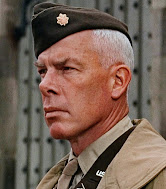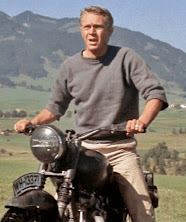 |
| Lee Marvin in The Dirty Dozen. |
Last year, I asked my 27,000 (awesome) Twitter followers to rate eleven of the finest World War II films of the 1960s. I wanted to keep my survey to a reasonable length, but it was tough to cut off the list at eleven. In fact, I initially tried to keep it at ten, but I just couldn't do it!
The reason is simple: The 1960s was an amazing decade for first-rate films set during World War II. Although Hollywood produced war movies during the 1940s and the 1950s, the number of major war movies exploded in the 1960s. There were films with big budgets and all-star casts (The Longest Day) as well as intimate pictures with rising stars (Hell Is for Heroes). There were fact-based movies (Battle of the Bulge) and espionage thrillers (36 Hours). Some films focused on daring escapes (Von Ryan's Express, The Great Escape), while others focused on daring missions (The Guns of Navarone, The Dirty Dozen, Where Eagles Dare). There were films about the U.S. Army, the U.S. Navy (In Harm's Way), and the British Royal Air Force (Battle of Britain).
 |
| Steve McQueen in The Great Escape. |
Interestingly, actors from
The Magnificent Seven appeared in a bunch of 1960s war films: Steve McQueen, James Coburn, and Charles Bronson in
The Great Escape; McQueen and Coburn in
Hell Is for Heroes; McQueen in
The War Lover; Coburn in
What Did You Do in the War, Daddy?; Bronson in
The Dirty Dozen and
Battle of the Bulge; Brad Dexter in
Von Ryan's Express and
None But the Brave; Robert Vaughn in
The Bridge at Remagen; and Yul Brynner in
The Battle of Neretva,
Triple Cross, and
Morituri.
Now, without further ado, here's my list of the 11 Best World War II Films of the 1960s, as ranked by the smartest film buffs on Twitter. I have also included a twelfth film, The Train with Burt Lancaster, because it was mentioned frequently in the responses to my original tweet. Twitter movie guru @CED_LD_Guy secured the rights to make these movies available on his channel on Rumble (which is similar to YouTube). I've added the links for you, so just click on a title below to watch the movie without ads for free! To view a film on your television, you'll need to add the Rumble app to your streaming device or smart TV and subscribe the channel (which is also free). If you want more information on how to do that, leave a comment below.
The Great Escape (1963) - Prisoners of war tunnel their way to freedom in this blockbuster starring James Garner, Steve McQueen, Charles Bronson, David McCallum, Donald Pleasance, Richard Attenborough, and James Coburn.
The Dirty Dozen (1967) - An Army major (Lee Marvin) has to train 12 military convicts for a deadly mission behind enemy lines.
The Longest Day (1962) - Daryl F. Zanuck produced this all-star epic about the D-Day landings at Normandy on June 6, 1944.
The Guns of Navarone (1961) - A team of commandos go undercover to destroy two large German cannons positioned strategically on Navarone Island. Based on an Alistair MacLean novel.
Where Eagles Dare (1968) - Another Alistair MacLean thriller provides the basis for this exciting tale about commandos tasked with rescuing a captured U.S. general from a mountain-top stronghold--but all is not as it seems.
Von Ryan's Express (1965) - Prisoners of war escape and hijack a train, racing through occupied Italy to their freedom in Switzerland. Check out my review.
Battle of the Bulge (1965) - This all-star epic is loosely based on the title battle, which lasted for several weeks near the end of World War II. The cast includes Henry Fonda, Robert Shaw, Robert Ryan, and Telly Savalas.
Battle of Britain (1969) - The Royal Air Force and the German Luftwaffe fight for control of the skies over Great Britain in this all-star picture starring Michael Caine, Trevor Howard, Laurence Olivier, Ralph Richardson, Michael Redgrave, Christopher Plummer and many more.
In Harms Way (1965) - Otto Preminger explores the lives of naval officers and their wives stationed in Hawaii in the months following the attack on Pearl Harbor.
Hell Is for Heroes (1962) - A small squad of U.S. soldiers must hold off an advancing German company until reinforcements can arrive. The cast includes McQueen, Coburn, Fess Parker, Bobby Darin, and Bob Newhart.
36 Hours (1964) - On the eve of the Normandy invasion, an American intelligence officer (James Garner) gets thunked on the head during a clandestine rendezvous with a spy. He awakes in an Allied military hospital five years later and is told he has been suffering bouts of amnesia. Or is he? Check out my review.
The Train (1964) - The French Resistance seeks to stop a train loaded with art treasures stolen by the Nazis.













































